Down by the Creek Where the Water Goes Slow
A song about mud sends me down a mucky rabbit hole.
I owe the focus of this post to the coincidence of four things within a short period. One was my decision to write about leaves and songs in my last post. That got me thinking elementally and doubtless put me in a receptive frame of mind for hearing Guy Clark’s song ‘Mud’. The third event was reading about ‘the Living Mud’ in Alex Pheby’s novel Mordew. The fourth was my encounter with muddy creeks on a Cornish headland, where all the previous events occurred and where I am currently writing.
Just like before, there's randomness, coincidence and connection in what follows. It should at least be as clear as mud.
I’ve been a Guy Clark fan for decades and his songs have made brief appearances in this newsletter already, though I’ve yet to respond to him in the manner I afforded his friend and fellow singer-songwriter Townes Van Zandt. I might, but this isn't that. It was inspired, though, by a song from The Dark, an album from twenty-two years ago which still gets regular listens on my car stereo alongside several other Guy Clark releases. It’s a lovely album, featuring late career classics such as ‘Homeless’ and ‘The Dark’, as well as a cover of Van Zandt’s ‘Rex’s Blues’.
‘Mud’, the album opener, is a co-write by Clark and Buddy Mondlock that uses the imagery of a muddy creek to evoke a sense of place, pace and patience.
Down by the creek where the water goes slow The green-backed heron and the moccasin know All things come to him who waits Yet he is lost who hesitates
The moccasin seems to be a reference to Native American knowledge, presence and curatorship in the place being evoked. The creek yields value for human and nonhuman seekers: mud signals life.
What I picture immediately is the co-presence of human and nonhuman prints and traces. Mud bears witness to those who pass through it and the evidence is laid out for anyone who stumbles upon the scene, for a while at least.
However faithfully mud records presence, it’s also treacherous and can be quick to change shape and consistency. Don’t be too patient while seeking in the mud, or you might find it’s too late: ‘life and death just dancing around in the mud’, as Clark quips in a closing line to the first verse that ramps up the song’s existentialist outlook.
And so the song proceeds, with verses made of couplets and pay-off lines about mud interspersed with a chorus that mixes mud-based phrases and proverbs—‘Mud pie, mud in your eye / Mud on a snake bite, don't you die’—with a recipe for getting closer to nature: ‘Take a little rain, take a little dirt / Make a little mud, get it on your shirt’.
‘Life and death just dancing around in the mud’. I’ve heard that line so many times over the years, but it resonated more in recent days.
Last week I finished reading Alex Pheby’s Mordew, the first in a trilogy of fantasy novels called ‘Cities of the Weft’. One of the book’s recurring nonhuman actors is the Living Mud. The book’s glossary describes this entity:
God should live in the heavens, where his native power makes few changes, but if and when he comes to Earth his magic leeches through the weft into the material realm around him. Any matter nearby undertakes the properties of creation, which is God’s province. The slum-dwellers of Mordew call this material the Living Mud, which is known for its ability to generate dead-life and living flukes.
The Living Mud lacks God’s will, so its creation is random and aimless. Should God’s will be combined with the creative matter, then it may evolve with a purpose through the stages of existence—from the primordial ooze via ever more complex organisms until it resembles God himself. Then it can be forced apart from the material world towards the perfect conceptual spirit, and from there to the end point: the combination of perfect matter and perfect concept which is godhood. Should a god attempt to exceed godhood, then only energy is created, though this might be seen by some to be a thing in and of itself, energy being the perfect representation of power: the warp, which is creative potency existing with no debasement through form, free of the weft.
This is heavy stuff. The glossary is by its nature more formal, foreboding and cosmic than the main text of the novel, which does its worldbuilding at a gentler pace. The reader realizes the importance and sheer vitality of the Living Mud and what emerges from it, but the novel keeps its relationship to divinities in the background.
Pheby’s Living Mud had already stuck with me (to me?) as a concept before I left Newcastle to begin a period of research and writing here in Cornwall. I finished the book during a period in which I was also walking and running regularly along the banks of muddy creeks. Mud is plentiful in the northeast, but I rarely get as muddy there as I have been in the past few weeks. Frequent rain in the southwest and my off-road routes have contributed to this.
Those routes have included paths, beaches and creek banks that put me in mind of Clark and Mondlock’s song as much as they did Mordew. There’s a particular inlet off the Penryn River, where the reeds grow tall, the mud feels treacherous, and the bird life is abundant.
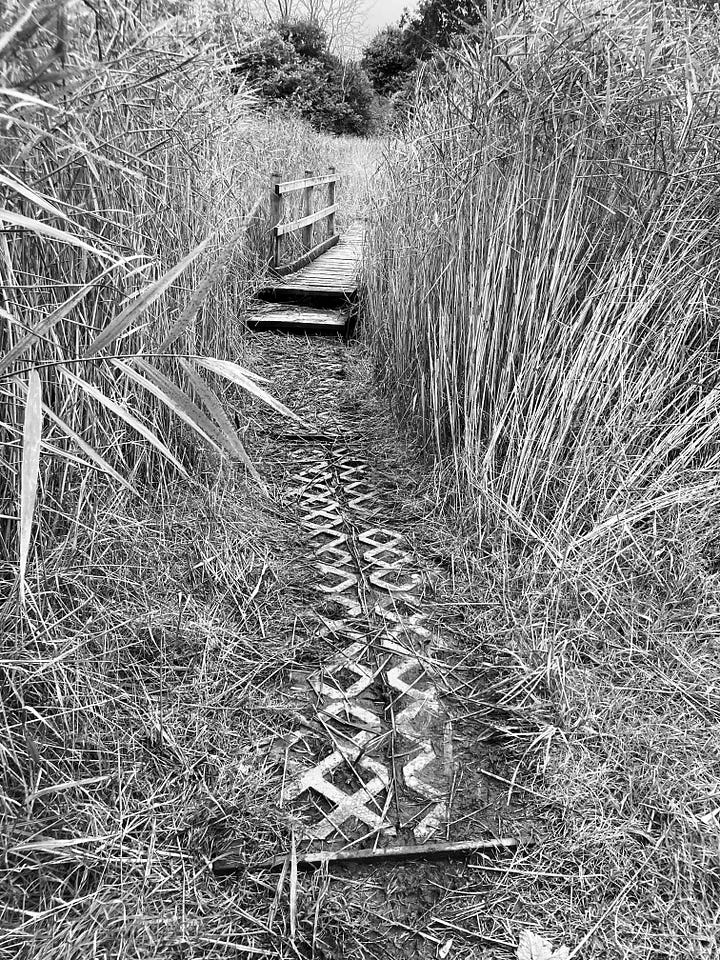
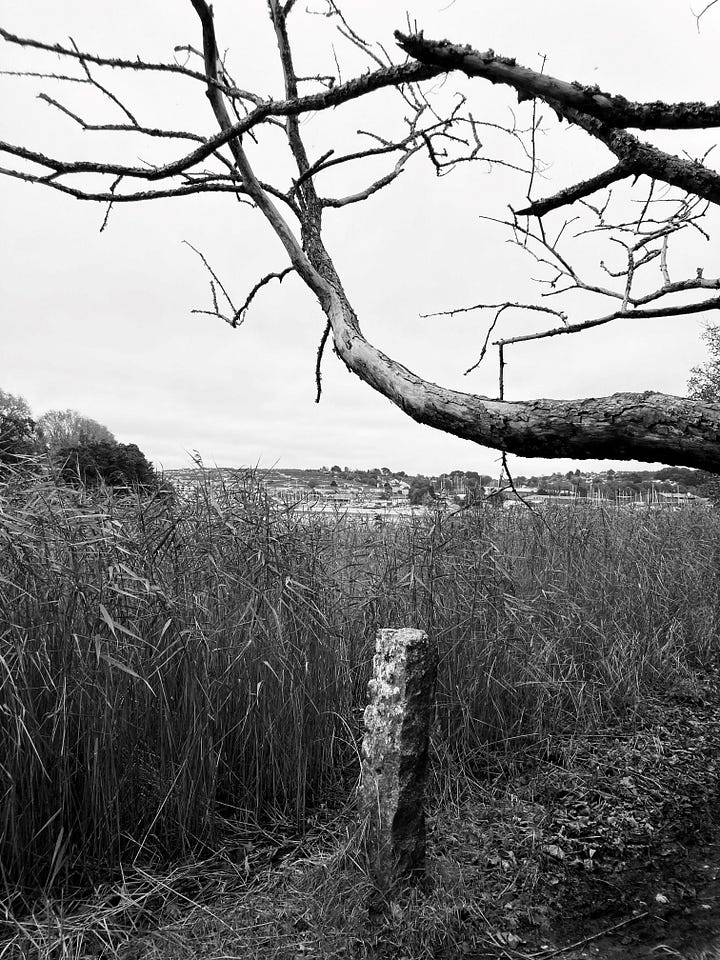
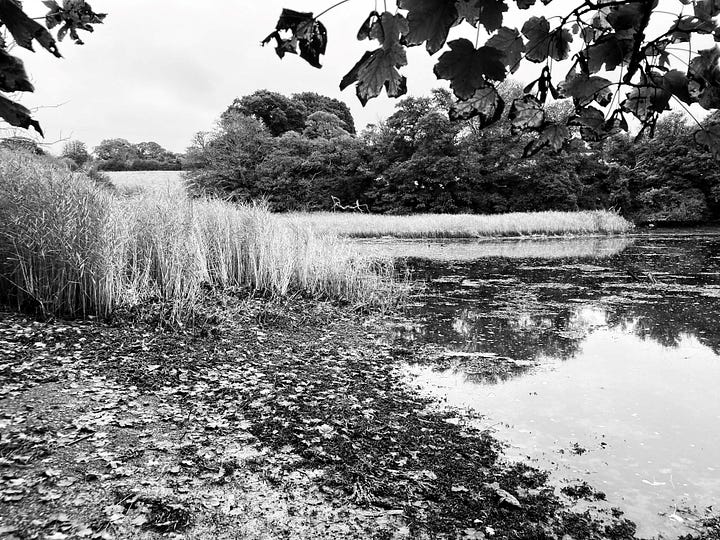
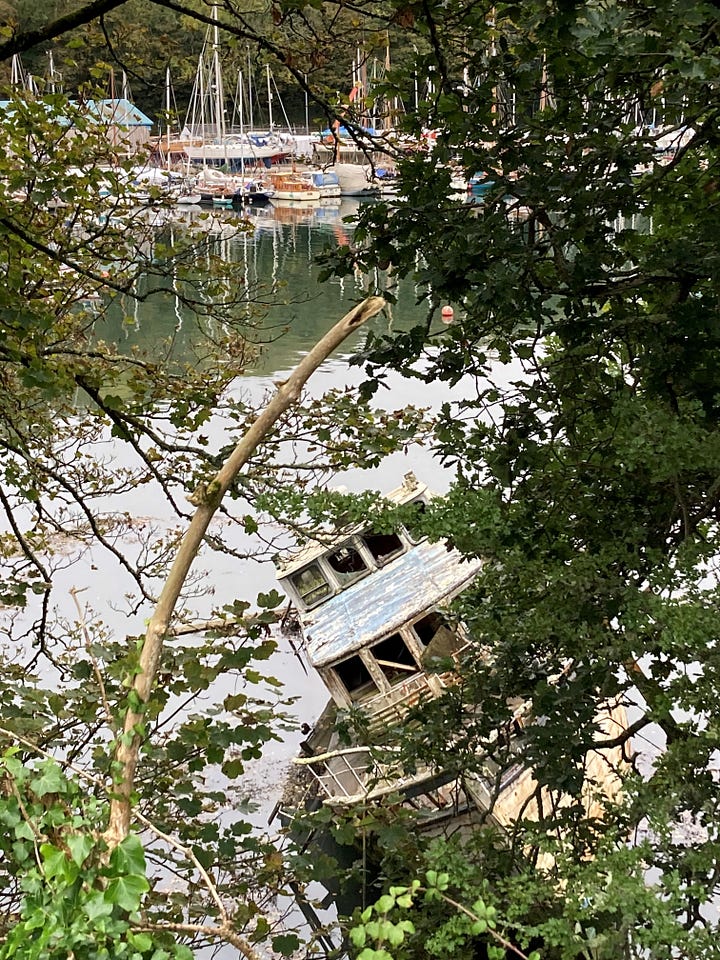
Birdwatchers catalogue their ‘finds’ from this stretch of the river, crowdsourcing a historical soundtrack of place. Less knowledgeable, I enjoy the mystery of new songs and squawks as I move along the riverbank. Where hedges and trees obscure the river, sound is often the first sign that I’ve disturbed wildlife. Jolted by the flapping of wings, by hasty take-offs through thick foliage, or by cries I wish could name, I sometimes find myself apologising out loud for my intrusion.
Well, the light comes down through the limbs and the leaves And dapples the water between the reeds The air tastes green, the bank gets soft Right about then your shoes come off You got to get it between your toes, the mud
—Guy Clark and Buddy Mondlock, ‘Mud’
What else moves through mud? Worms, roots, rhizomes.
Though at the same time so attached to the earth, so touching and slow, so progressive and so capable of detaching myself from the earth to withdraw into myself and let the world go hang—a light kick can send me rolling anywhere. Yet I am quite sure of regaining my footing and re-attaching myself to the earth, wherever fate may have sent me, and finding my pasture right there: earth, most commonplace of foods.
Francis Ponge, ‘Snails’, translated by Beth Archer in Francis Ponge, The Voice of Things.
I think of mud’s modalities: wet, sloppy, sticky, smooth, sucking, splashing; dried, cracked, brittle.
I think about what lies beneath: bones, treasure, evidence, layers of the long dead, the living, the revivable. Cities, forests, rivers, bodies. The outcomes of accidents, crimes and cruelty, but also forgotten beauty.
I listen to songs that mention the pavement or the concrete turning to sand. Where I live, the pavements turn to mud.
I rise at six in Mylor Bridge, leaving the faintest ripples in the bed. I drink tea and sit silently until seven. I leave the house and walk down the hill through the village to the heavy wooden park gate. I run and don’t stop until I reach the park gate at Flushing. I run over dew-damp grass, along leaf-plastered lanes, over stones and stiles, sand and seaweed and rocky beaches, under trees, behind houses where people are rising, past dogs and their walkers, and through the living mud. Along the creek, around the headland, towards the sea.
The sun shines on the return leg, revealing the icy blue water of the Fal River to my right. Faint ripples remind me of the unmade bed I left earlier. The mud splashes my legs as I make my way home.

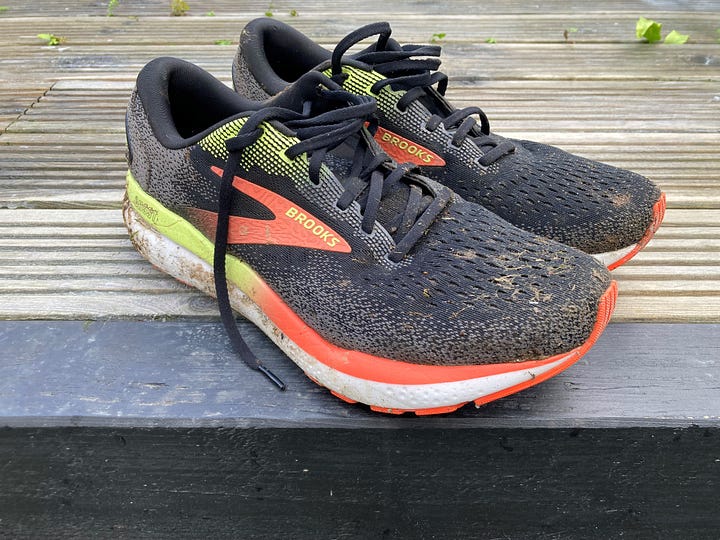
Muddy turns of phrase: mud in your eye, mudslinging, muddy the waters, clear as mud, your name is mud, stick-in-the-mud, mudlarking.
Muddy mixes: what audiophiles love to complain about.
The various pieces titled ‘Muddy Mouse’ and ‘Muddy Mouth’ on Robert Wyatt’s Ruth Is Stranger than Richard concern themselves with a muddiness of language and/as sound. Wyatt runs words together so that they mean or suggest something else. This is most obvious in ‘Muddy Mouth’, a song riddled with ‘dirty’ innuendo in its second half. Its first part sounds a murkiness of sound rather than lyric, using an electronically enhanced mouth music to suggest sense beyond or before words. If the song’s lyrics are infantile in one way, the wordless parts are in another, enacting a coming-into-language via watery wah-wahs.
There’s mud in the lyrics too, especially in ‘Muddy Mouse (C)’.
What do Ann and Handy do after a long, exhausting shift? Clean the spades and clear away the dirt? No, of course not! Usually they lie down in the mud Close together, just to save on heat
I think of a silly song about mud by Robert Wyatt’s friend and collaborator Ivor Cutler. I start a list of other songs that mention mud, dirt, earth, clay, soil and sand: Madeleine Peyroux’s ‘Muddy Water’, Brad Paisley’s ‘Mud on the Tyres’, Gillian Welch’s 'Red Clay Halo', Emmylou Harris’s ‘Red Dirt Girl’, Jerry Garcia and Robert Hunter's ‘Black Muddy River’, Loudon Wainwright’s ‘A Handful of Dust’, Dick Gaughan’s Handful of Earth album (its title taken from Ed Pickford’s ‘Worker’s Song’), Butch Hancock’s ‘Dry Land Farm’ and his other ‘dust-blown tractor tunes’, Woody Guthrie’s parched Dust Bowl ballads, Howe Gelb’s sand-blasted songs.
I stop. What’s the point? I expect someone else has already done this. I find they have. I see that there’s almost no overlap. Should I continue with my list? I decide not to, and I move on to other connections.
Here then, is the present image of what we are likely to become. And in this way are the past and the future present. Everything has gone into it: not only the flesh of the three kingdoms, but the action of the other three elements: fire, air and water. And space, and time. What is completely spontaneous in man as he touches the earth is an immediate feeling of familiarity, sympathy, or even veneration, of a filial kind. Because earth is matter to the highest. So then, veneration of matter: is anything more fitting for the spirit? Whereas spirit venerating spirit. . . can you see that? —One sees only too much of it.
Francis Ponge, ‘Earth’, translated by Beth Archer in Francis Ponge, The Voice of Things.
In the early pages of Mordew, the protagonist, Nathan Treeves, goes searching for things that can be retrieved from The Living Mud and sold.
In front was a circle marked by the feet of the children who surrounded it, large enough so that the faces on the other side were too distant to make out, but not so large that you couldn’t see that they were there. The ground gave way and sloped, churned up, down to a wide Mud-filled pit. Some stood in it, knee deep at the edges, waist deep further out. At the distant middle they were up to their necks, eyes shut, mouths upturned, fishing in the writhing thickness by feel. These in the middle had the best chance of finding a fluke—the complexity of the organisms generated by the Living Mud, it was said, was a function of the amount of it gathered in one place—while those nearer the edge made do with sprats.
—Alex Pheby, Mordew
The denizens of Mordew are steeped in mud, and those who wish to profit from their environment are what elsewhere would be called mudlarks. As Lara Maikem recounts in her books Mudlarking and A Field Guide to Larking, there have long been ways to make a living from what’s preserved by the living mud of London:
There have probably been river scavengers on the Thames for as long as there has been a living to be eked from its mud, but the first written mention of a “mud-lark” was in 1796, in a book entitled A Treatise on the Police of the Metropolis, written by a Scottish magistrate called Patrick Colquhoun … He estimated that 10, 850 people were involved in stealing from the ships that sat at anchor in the Pool of London, between London Bridge and Limehouse, waiting to offload their valuable cargoes of rum, sugar and spices. At the bottom of his list of miscreants were the mudlarks, who lurked around the ship hulls at low tide searching for rope, coal and old bits of wood, and collecting the contraband that was dropped overboard.
—Lara Maikem, A Field Guide to Larking
Maikem’s books, along with others such as Jason Sandy and Nick Stevens’ Thames Mudlarking, offer catalogues of objects that, prior to their discovery, had been preserved by the mud’s anaerobic (oxygen-free) qualities.
I’m tempted to think of the riverbed as curator or caretaker, but this would be incorrect. The riverbed doesn’t care. Its preservation is more like a neutral documentary of what remains after time and tide have done their work.
‘Mud and metal mixing good’. A line from Grandaddy’s song ‘Broken Household Appliance National Forest’. The song describes an all-too-familiar ecology of human detritus. The description sounds positive at first, but Jason Lytle’s technopastoral habitat is like the ‘cybernetic meadow’ imagined by Richard Brautigan in his poem ‘All Watched Over by Machines of Loving Grace’, a superficially utopian vision of human and nonhuman cohabitation with an ironic undertone that recognises the reality of a planet scorched by obsolescent junk.
Meadows resemble showroom floors Owls fly out of oven doors Stream banks are lined with vacuum bags Flowers reside with filthy rags A family of deer were happy that The clearing looked like a laundry mat
—Jason Lytle, ‘Broken Household Appliance National Forest’
I like to think (right now, please!) of a cybernetic forest filled with pines and electronics where deer stroll peacefully past computers as if they were flowers with spinning blossoms.
Richard Brautigan, ‘All Watched Over By Machines of Loving Grace’
From a review of an album by synth band Forma that I wrote in 2011:
A warm wetness pervades much of the album (again, that sense of nature, of clay and soil and rivers; the motorik heartbeat of the earth; the ether’s pulse). But there is also a cold dampness, a chill that comes from the creeping-in of dissonance, the foreboding of sinister resonances around the corner. Roland TR-707 and its smaller sibling Alesis send out assertive drum pad pulses one minute, then stutter and fall the next. An arpeggio is left dangling in the breeze at the mercy of wild beats, while the sound of wind echoes down the corridors of “FORMA230.” The sense of abandonment, of nature’s isolation, is even stronger on the closing “FORMA237B,” where droning synths drag slavishly along to a dominant drumbeat, seemingly wishing, but not being able, to cease their programmed act. It’s a software slump reminiscent of Grandaddy’s “Broken Household Appliance National Forest” or the “cybernetic meadow” that Richard Brautigan dreamed of in his poem “All Watched Over by Machines of Loving Grace.”
Thinking about Grandaddy’s mud and metal while writing these fragments, I knew I’d connected them to Brautigan some time ago. I had to go searching through silted layers of internet history to find them. Tiny Mix Tapes, the site I reviewed Forma for, no longer exists except in pages stored at the Internet Archive. Finding such items is like mudlarking cyberspace.
I realise, too, that there are thoughts and connections I go back to repeatedly. I’ve long been drawn to the organicism of electronic music, especially synth-based music, mesmerised by shapes that form and mutate as pieces develop. In these post-Mordew days, I think about flukes forming in the living mud of electro textures.
I guess it also has something to do with squelch, that wonderful onomatopoeic word that gets applied to mud and synthesisers. I find it satisfying that Roland, the company that produces the instruments heard on Forma, has an article on its website about ‘the secrets of squelch’.
I start taking more mud-themed photos than usual. Muddy lanes, muddy fields, mud-caked trainers, boats in mud, birds in mud, footprints in mud, tyre tracks in mud, ‘muddy road’ signs.

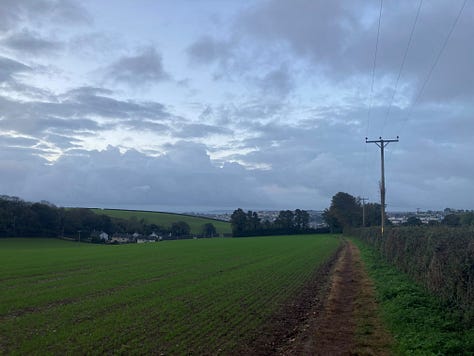
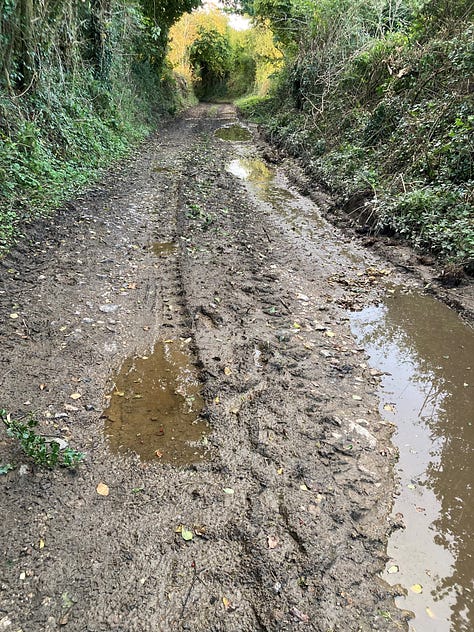
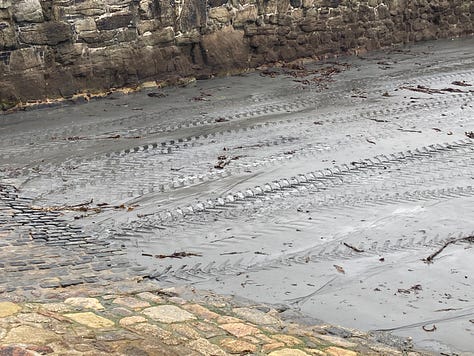
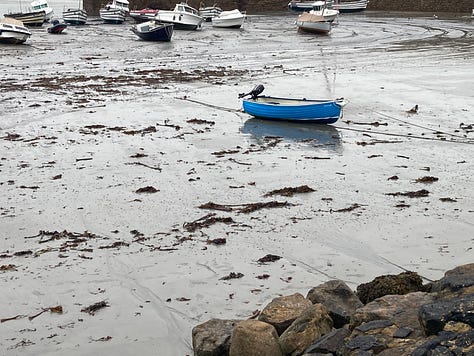
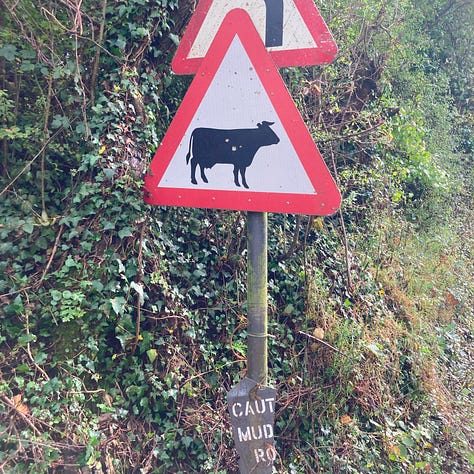
It feels like a new obsession, but I realise it’s not, that I have a longer history with the aesthetics of mud. I don’t have them to hand, but I recall the many photos I took two decades ago of the River Tyne at low tide, its muddy sheets crisscrossed with the traces of water, wildlife and human carelessness. From further back again, I dredge the memory of a poem I wrote about the ‘wet life of mud’, a poem that fluked its way back into my brain earlier this year while I was running.
Another book I’ve been working through: David George Haskell’s Sounds Wild and Broken. In the opening pages, Haskell refers to ‘mud soup’ and evokes the sounds of muddy creeks. Later, in a passage on underwater evolution and predation tens of millions of years ago, he identifies sound as a driving force:
The sound-making animals that evolved and diversified during this time were almost all predators, most of them also formidably defended by tough skeletons or speedy bodies: spiny lobsters, lobsters, snapping shrimp, and fish. Sound making was a luxury enjoyed only by those at the top of a rich food chain. Prey animals at this time stayed silent and evolved thicker shells, and many took to living buried in mud and sand.
Did I spend too much of my time on earth hiding in the mud, cowed by noisy predators and hoping they wouldn’t notice me?
Like many people, I suppose, I’ve been enculturated to think of swans ‘gliding’ through water as the epitome of avian elegance. But I found the sight, and especially the sound, of these swans wading through creekside mud in Cornwall to have its own soothing elegance.
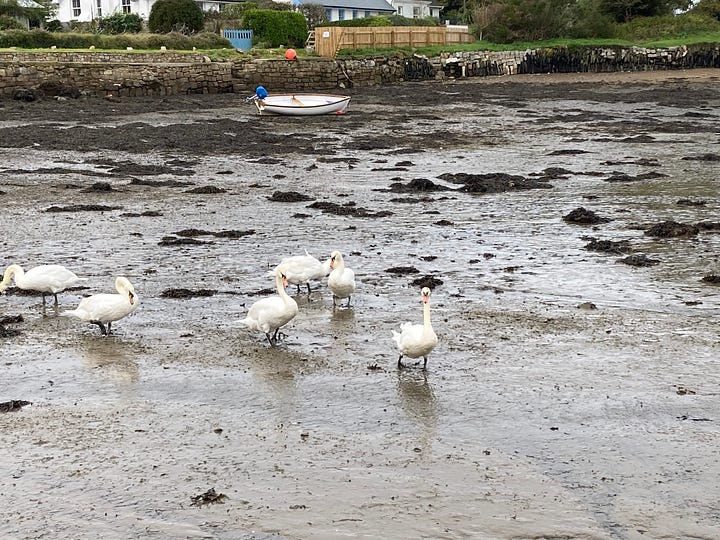
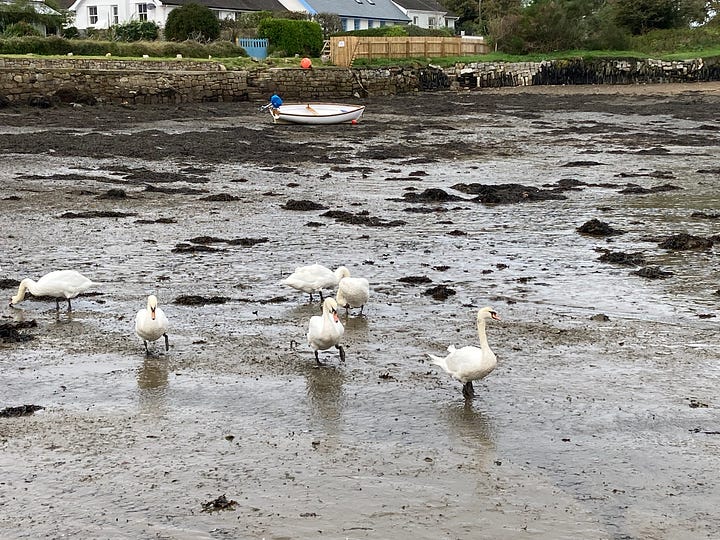
In a stable which is almost in the shadow of the new stone church, a man with gray eyes and gray beard, lying amidst the odor of the animals, humbly seeks death as one would seek sleep. The day, faithful to vast and secret laws, is shifting and confusing the shadows inside the poor shelter; outside are the plowed fields and a ditch clogged with dead leaves and the tracks of a wolf in the black mud where the forests begin. The man sleeps and dreams, forgotten. He is awakened by the bells tolling the Angelus. In the kingdoms of England the ringing of bells is now one of the customs of the evening, but this man, as a child, has seen the face of Woden, the divine horror and exultation, the crude wooden idol hung with Roman coins and heavy clothing, the sacrificing of horses, dogs and prisoners. Before dawn he will die and with him will die, and never return, the last immediate images of these pagan rites; the world will be a little poorer when this Saxon has died. Deeds which populate the dimensions of space and which reach their end when someone dies may cause us wonderment, but one thing, or an infinite number of things, dies in every final agony, unless there is a universal memory as the theosophists have conjectured. In time there was a day that extinguished the last eyes to see Christ; the battle of Junín and the love of Helen died with the death of a man. What will die with me when I die, what pathetic or fragile form will the world lose? The voice of Macedonio Fernández, the image of a red horse in the vacant lot at Serrano and Charcas, a bar of sulphur in the drawer of a mahogany desk?
—Jorge Luis Borges, ‘The Witness’, translated by James E. Irby, Labyrinths
As a teenager, I would walk a lot on Dartmoor, long hikes far from roads and well-worn trails, crossing open land, always aware of the treachery of the mud and especially the peat bogs. There’s something primordial about the ooze one finds in those bleak spots. Animal bones tell stories of inescapable fates and wrong routes taken. The peat bogs put you in mind of lonely eternities, of last things and lost souls.
One time, taking part in a five-Tors hike, my group got lost on the moor when the fog descended. When we failed to show up where we were supposed to, a search party was sent out and parents were informed. Oblivious to the concern we were causing, we stumbled upon a remote farmhouse inhabited by friendly souls who brought us back to something resembling comfort with tea and biscuits.
The recent popularity of the Irish band Lankum has brought the song ‘Peat Bog Soldiers’ to many new ears. It’s a song with a fascinating history and many versions in several languages. The original ‘Moorsoldaten’ had German lyrics by Johann Esser and Wolfgang Langhoff and music by Rudi Goguel. Some of the postwar American folk and protest singers who made the English language version popular would also include the German lyrics, Pete Seeger’s mid-1960s version being one example. It’s the English lyrics that I’m familiar with, and the moorland imagery that they evoke:
Far and wide as the eye can wander Heath and moor are everywhere, Not a bird sings out to greet us, Trees are standing gaunt and bare. We are the peat bog soldiers, Marching with our spades to the moor.
A performance of the song by Pete Seeger appears on an album of his I reviewed many years back, another piece of writing now stratified into the digital terrain. It’s Lankum’s ‘Peatbog Fairies’ I think of these days, but I find it useful to remember this earlier encounter with the song. I like how songs visit us at distinct moments with different purposes.
I get bogged down in connections. I’ve always been like this. I get fascinated by a topic, then follow it in the many directions it may lead me. Sometimes this takes me down the pathways of memory, as one half-recalled experience tags another. Just as often it’s a tumble down the bespoke rabbit holes that result from the combination of endless curiosity and an internet connection.
Every mudlark should know when it’s time to stop seeking and get out of the ooze. At some point, you have to call the search party off and head back to the nearest thing that feels like home.
Now when I die, please bury me Down by this old muddy creek Let the crawfish have their way It's mud to mud and that's okay We all just crawled out of the mud
—Guy Clark and Buddy Mondlock, ‘Mud’
Where footprints stop and mud turns to water, that’s where you get away.

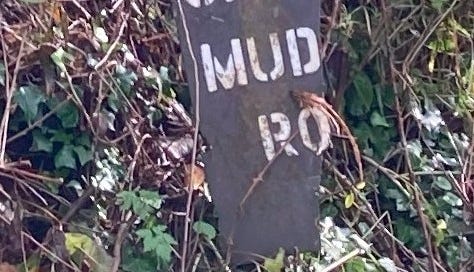


Lovely piece Richard. An album I love to this day is Richard Buckner's Bloomed. One of the great break-up albums. A favourite track is 'Mud'. The whole record is his Mud on the Tracks!
https://www.youtube.com/watch?v=5XE_2PNbflQ
Another fascinating deep dive that starts in one spot, but like your daily run, it eventually leads us through many paths of thought only to return full circle. As I read it, I kept thinking of Mark Lanegan's thick and brooding "Bleeding Muddy Water" off his 'Blues Funeral' LP.